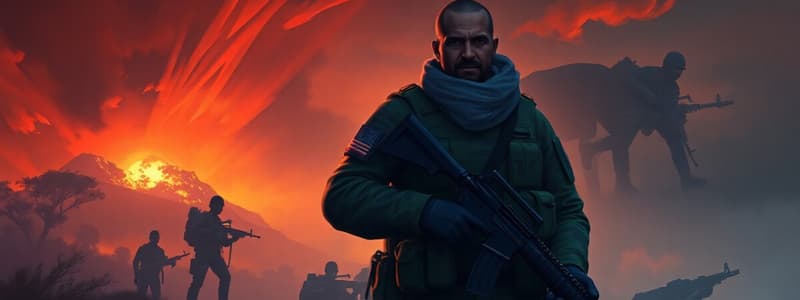Podcast
Questions and Answers
What was the purpose of the EUFOR DRC mission during the polls?
What was the purpose of the EUFOR DRC mission during the polls?
- To provide security for the polling process (correct)
- To train local military forces
- To assist in rebuilding infrastructure destroyed by conflict
- To implement economic reforms in the DRC
Which of the following tasks remained for MONUC after the 2006 elections?
Which of the following tasks remained for MONUC after the 2006 elections?
- Creating a stable security environment (correct)
- Negotiating peace treaties with rebel groups
- Dismantling the existing government structure
- Establishing a central bank for economic stability
Which criterion is most widely used to assess the success of peacekeeping missions?
Which criterion is most widely used to assess the success of peacekeeping missions?
- Implementation of the mission mandate (correct)
- Expansion of international trade
- The establishment of a new government
- Reduction in military expenditures
What was highlighted as a major issue in North Kivu after the elections?
What was highlighted as a major issue in North Kivu after the elections?
What is one of the mandated tasks of MONUC concerning local elections?
What is one of the mandated tasks of MONUC concerning local elections?
What was the primary cause of the 1996 insurgency that led to the fall of Mobutu's regime?
What was the primary cause of the 1996 insurgency that led to the fall of Mobutu's regime?
Which event directly followed the signing of the Lusaka ceasefire in July 1999?
Which event directly followed the signing of the Lusaka ceasefire in July 1999?
Which of the following countries was NOT involved in the new war launched in August 1998 against President Kabila?
Which of the following countries was NOT involved in the new war launched in August 1998 against President Kabila?
What was the outcome of the Inter-Congolese Dialogue that took place in December 2002?
What was the outcome of the Inter-Congolese Dialogue that took place in December 2002?
How did Joseph Kabila's leadership differ from that of his father, Laurent Kabila, particularly regarding conflict resolution?
How did Joseph Kabila's leadership differ from that of his father, Laurent Kabila, particularly regarding conflict resolution?
Flashcards
MONUC's core tasks in DRC
MONUC's core tasks in DRC
The United Nations Organization Mission in the Democratic Republic of the Congo (MONUC) was tasked with helping to establish a stable security environment, reforming the security sector, strengthening the rule of law, protecting civilians, and assisting the Congolese government in preparing for local elections.
Post-election violence in DRC
Post-election violence in DRC
The 2006 elections in the DRC were followed by continued violence, particularly in North Kivu, where fighting between rebels and the army led to the displacement of many civilians.
Assessing Peacekeeping Success
Assessing Peacekeeping Success
Assessing the success or failure of a peacekeeping mission can be done by evaluating whether the mission's mandate was implemented and if the mission helped to reduce human suffering.
Challenges in assessing long-term success in DRC
Challenges in assessing long-term success in DRC
Signup and view all the flashcards
Criteria for assessing peacekeeping success
Criteria for assessing peacekeeping success
Signup and view all the flashcards
The 1997 Rebellion in Zaire
The 1997 Rebellion in Zaire
Signup and view all the flashcards
RPF's involvement in the 1997 Zaire rebellion
RPF's involvement in the 1997 Zaire rebellion
Signup and view all the flashcards
The Second Congo War (1998)
The Second Congo War (1998)
Signup and view all the flashcards
The Lusaka Accord
The Lusaka Accord
Signup and view all the flashcards
Joseph Kabila's role in resolving the Second Congo War
Joseph Kabila's role in resolving the Second Congo War
Signup and view all the flashcards
Study Notes
Peacekeeping in the Democratic Republic of Congo
- The UN peacekeeping mission in the Democratic Republic of Congo (MONUC) has been criticized for its ineffectiveness, assessed using mandate implementation and human suffering reduction
- Two major problems hampered effective peacekeeping:
- Struggle with and inconsistent approach to 'robust peacekeeping'
- Failure to adapt to the dynamic conflict environment
- Flawed assumptions about the peace process, local actors, and post-conflict elections
- More than a decade of violence (costing 5 million lives) culminated in peaceful 2006 post-conflict elections, a major political achievement
- MONUC, the UN's peacekeeping mission, has been the centrepiece of international engagement, becoming a multidimensional peacekeeping mission with a broad mandate
- Comprehensive assessments of MONUC have been rare, despite its size and expense (18,434 uniformed personnel in 2008)
- Criticism of MONUC's performance has been intense, with concerns about its effectiveness and accusations of impotence and cowardice
- The article's first part provides an overview of the Congo conflict, MONUC's deployment phases, and mandate/troop evolution
- The second part assesses MONUC's performance against mandate achievement and human suffering reduction criteria
- Exogenous factors, including mandate, means, and resources, and issues of multidimensional peacekeeping under Chapter VII, were analysed as factors influencing MONUC performance
- Endogenous factors, such as strategic assessments and strategic adjustments, were also assessed for relevance.
Congo Wars
- The Congo Wars (1996-97 and 1998-2003) were complex, intertwined regional and national conflicts
- Regional conflicts in Rwanda, Uganda, Burundi, and Angola, combined with struggles over control of the post-Mobutu state, and ethnic conflicts, characterized the violence
- The Wars involved an insurgency led by Laurent Kabila, who overthrew the Mobutu regime in 1997, with the Rwandan Patriotic Front (RPF) playing a major role
- In 1998, Rwanda, Uganda, and Burundi launched a new war against Kabila, accusing him of unwillingness to address their security concerns
- Ceasefire agreements (Lusaka Agreement, 1999, and Pretoria Accord 2002) were signed, but conflicts continued, particularly in eastern regions
- In 2001 and 2006, presidential elections were held, transitioning the country towards stability
Four Phases of UN Peacekeeping
- The mission's four phases are detailed, noting the growth of the mandate and troop numbers over time
- The 'Kinshasa phase' (2003-2004) focused on supporting the transitional government, accompanied by crises in Bunia (2003) and Bukavu (2004)
- MONUC experienced major difficulties in implementing its mandate to protect civilians, as well as in the disarmament of foreign combatants (and fulfilling the mandate in DDRR), a topic that was crucial for the mandate's fulfilment
- The 2006 and 2007 elections, a key moment in the mission's second phase, were noted as a noteworthy achievement, despite continuing violence
- Assessing human suffering reduction via analysis of internal displacements, showing a complex correlation with the political outcomes and various issues throughout the mandate implementation
Mandate Implementation and Human Suffering
- Analyzing successful but flawed implementation of the mandate was completed, evaluating its effectiveness in relation to reducing human suffering based on internal displacement figures
- MONUC's performance was inconsistent; it had some successes, notably organizing 2005/2006 elections, but its failure to protect civilians consistently was a key criticism
Exogenous and Endogenous Factors
- External factors, such as a difficult political environment in the DRC, weak state institutions, and neighbouring conflicts, contributed to peacekeeping challenges.
- Internal factors, such as unclear mandate interpretation ('robust peacekeeping'), strategic adaptation, poor leadership and miscommunication, and insufficient resources contributed to the mission's mixed achievements
Studying That Suits You
Use AI to generate personalized quizzes and flashcards to suit your learning preferences.




